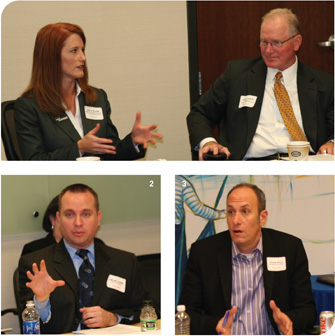
1: Dave Janus of M&I Bank assesses assembly co-chair Kelli Glynn's comments on the costs of regulatory compliance. | 2. Jim Williams of Creative Planning said clients are paying more attention to the people in control of their money. | 3. Adam Bold of The Mutual Fund Store has noticed a marked decline in investors' level of patience as older investors fret about portfolio losses.
The Uncertainty Principle
In an age of economic uncertainty that may last longer than anyone would like, Kelli Glynn asked her colleagues what effect that uncertainty was having on the mood of their clients and the way they do business.
“The average small business owner is probably the most concerned he’s ever been,” said Steve Harrison of Edward Jones. This does not mean that said business owner is fearful, Harrison clarified, but “deliberative,” and that translates into more discussion with his financial adviser.
“We always had a lot of contact with clients,” confirmed Lana Maudlin of M&I Wealth Management, “but clients want more and increased contact, and they also want more info.” That information is often very specific, and this puts additional pressure on advisers to be “well rounded.”
Adam Bold, founder of The Mutual Fund Store, believes that clients are less patient with their investments than they once were. Time frames have shortened, and advisers, said Bold, need to be well-enough informed to give clients “what they need, not necessarily what they want.”
“What clients are really demanding is what I would call non-tax issues,” said Jim Betterman, an attorney with Lathrop & Gage. “They are very concerned about generational issues. They are concerned about kids and how they are going to handle money.”
“I think clients are more demanding—and they should be—of their advisors,” said Steve Toomey, a principal at BKD Wealth Advisors. Toomey observed that the downturn at the beginning of the decade was equity-driven and less unsettling. Clients now perceive structural changes in the economy that are here to stay and, as a result, want to know how these changes will affect their fortunes going forward.
Steve Soden, president and CEO of Tower Wealth Managers, argued that the years 2008-2009 “totally redefined what a good night’s sleep was.” He now sees more risk-aversion and less anxiety about keeping up with one’s neighbors. “It’s a completely different ballgame,” he noted.
“We are really questioning generational givens,” said Dave Janus. “We are questioning home ownership now as to whether it really makes sense.” Investors have also had to reevaluate their pensions and 401(k) plans and other retirement assets.
K.C. Matthews, UMB’s chief investment officer, was not convinced that the current downturn was long or painful enough to induce dramatic behavioral change on the part of investors. “I’m not sure [the downturn is] a game-changer when you compare it to the Depression,” he argued.
Contributing to the change in environment are the regulatory burdens triggered by this downturn and the accounting scandals earlier in the decade. As Adam Bold noted, they have made prospectuses more complicated and financial intermediaries more necessary.
One change triggered by the Bernie Madoff scandal and other Wall Street misbehaviors is the growing investor concern about what Jim Williams, investment manager for Creative Planning, called “custody.” Clients, said Williams, now think in terms of “Who has your money? Are you at an institution you consider safe?”
Silver Linings
Kent Gasaway, portfolio manager at Kornitzer Capital Management, saw at least one silver lining in this uncertain era. The volatile market has allowed Kornitzer to hire talented people the firm would not normally have a chance to attract. It has also given them a chance to buy solid companies and under-priced stocks.